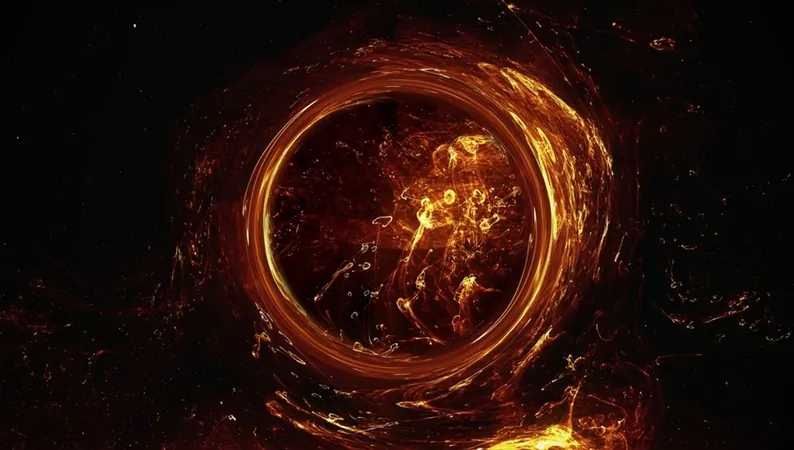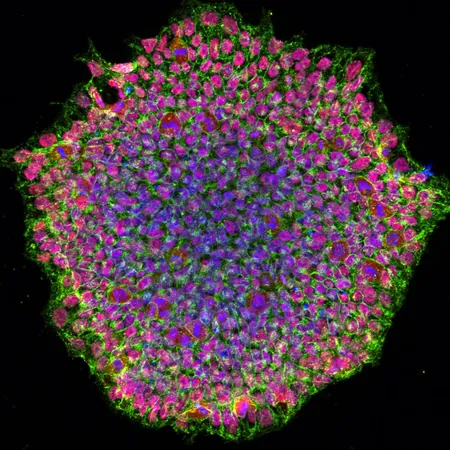
Physicist Unveils a Fascinating New Angle on the Time Travel "Grandfather Paradox" – You Won't Believe the Twist!
2025-03-29
Author: Daniel
Introduction
Time travel has long been a subject of fascination in both science and fiction, but the concept isn't without its complications, particularly the infamous "grandfather paradox." This thought experiment is straightforward yet mind-boggling: If you had a time machine and ventured back to kill your grandfather before he had children, it creates a logical conundrum. If you're successful, your parent wouldn't be born, meaning you could never exist to undertake such a journey in the first place.
Theoretical Background
Renowned physicist Stephen Hawking suggested that this paradox implies time travel may be impossible, theorizing that there are unknown laws of physics that could prevent it. However, according to the theories developed from Einstein's work, time travel to the past is not completely off the table. One intriguing idea involves "closed timelike curves" (CTCs), where space-time is so warped—possibly around a supermassive black hole—that someone could theoretically return to their own point in time.
Gavassino's Research
Lorenzo Gavassino, a physicist at Vanderbilt University, has recently published a paper delving into this very possibility. He explores what happens to a person or object traveling along these curves through time. Gavassino points out that several assumptions accompany time travel narratives, particularly the reality of self-consistency when time travelers return to their past.
In his research, he integrates the laws of thermodynamics, which dictate that everything tends to move toward disorder or entropy. This increase in entropy reveals a one-way arrow of time—once things become disordered, like an egg that has been cooked, they cannot revert to their original state.
Entropy and Time Travel
As he examined the behavior of a spaceship traversing a closed timelike curve, Gavassino had to reconcile the effects of entropy with the concept of returning to an earlier point in time. Intriguingly, he discovered that while entropy would increase during such a journey, the universe would still work to return the spaceship to its point of origin in a consistent state.
Memory and Identity
Here’s where it gets fantastically puzzling: His findings suggest that, during this time travel loop, any memories gained through experiences would be erased. Gavassino explains that memory is tied to interactions and traces left behind in systems. Thus, he theorizes that any memory formed while on a CTC would disappear before the traveler returns to their original time.
Moreover, his calculations reveal that near the end of a closed loop, particles experience a peculiar sort of resurrection, effectively reversing their previous states just in time for time travel to conclude smoothly AND consistently. This raises tantalizing questions about the implications of memory and identity in time travel scenarios.
Conclusion
"Most physicists and philosophers have suggested that if time travel exists, nature will inherently prevent scenarios that lead to contradictions," Gavassino noted. His research works through the framework of quantum mechanics, leading to a groundbreaking yet cautionary conclusion: while time travel might be theoretically conceivable, it would not manifest in ways depicted in popular culture.
He emphasizes that nature operates with an unpredictability and creativity that often surpasses our imaginative interpretations. Instead of grand adventures through time, Gavassino’s work poses the idea that those who traveled might merely repeat their experiences without the benefit of memory—trapped in an eternal loop of déjà vu.
The exciting revelation is worth considering, as it adjusts our understanding of time travel, moving from thrilling science-fiction scenarios to more nuanced scientific theories. With the full paper published in *Classical and Quantum Gravity*, it challenges time travel enthusiasts around the world to rethink their favorite scenarios through a scientific lens, and perhaps prepare for a future where their journeys remain locked away in the recesses of lost memory.


 Brasil (PT)
Brasil (PT)
 Canada (EN)
Canada (EN)
 Chile (ES)
Chile (ES)
 Česko (CS)
Česko (CS)
 대한민국 (KO)
대한민국 (KO)
 España (ES)
España (ES)
 France (FR)
France (FR)
 Hong Kong (EN)
Hong Kong (EN)
 Italia (IT)
Italia (IT)
 日本 (JA)
日本 (JA)
 Magyarország (HU)
Magyarország (HU)
 Norge (NO)
Norge (NO)
 Polska (PL)
Polska (PL)
 Schweiz (DE)
Schweiz (DE)
 Singapore (EN)
Singapore (EN)
 Sverige (SV)
Sverige (SV)
 Suomi (FI)
Suomi (FI)
 Türkiye (TR)
Türkiye (TR)
 الإمارات العربية المتحدة (AR)
الإمارات العربية المتحدة (AR)